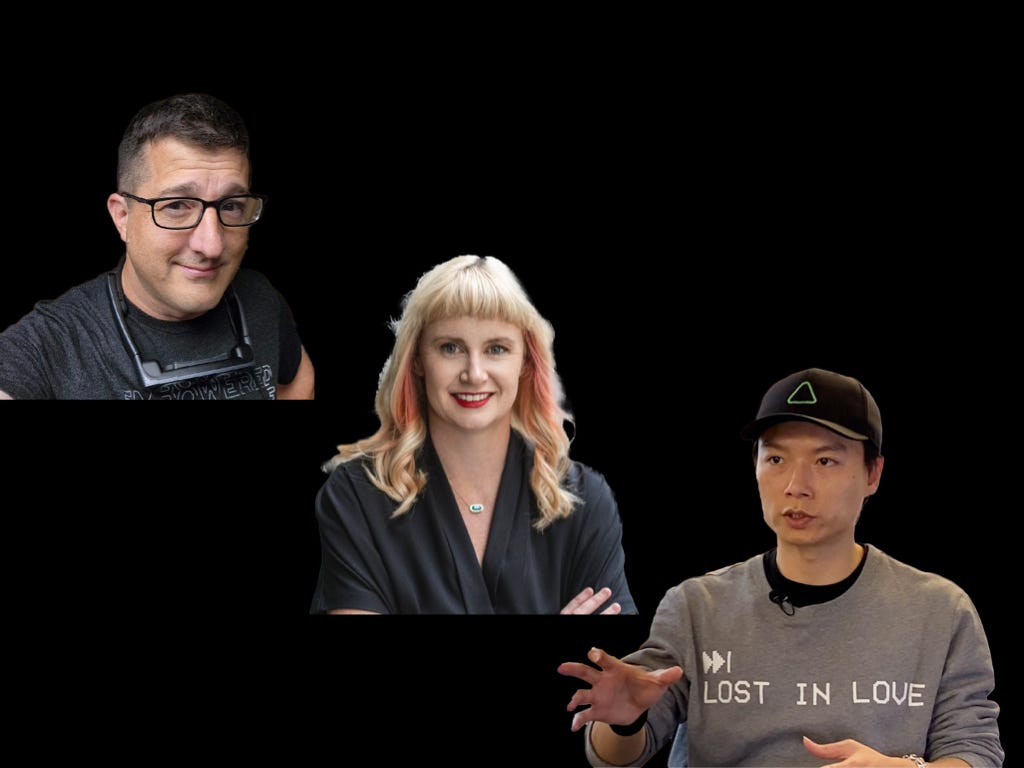How will AI and virtual reality change education?
See what 3 future-oriented people are thinking and doing
We all agree that many of the ways we learn are outdated. So what to do?
I asked three of my Imaginize.World video guests what they thought: Chen Quifan, Mark Gröb and Cortney Harding. Learn more about them and their ideas below.
Who they are…
Chen Qiufan (aka Stanley Chan)
A globally recognized leading Chinese scifi visionary, futurist and humanist, prize-winning Chen Qiufan (aka Stanley Chan).
Chen is author of Waste Tide, 2013, published in English in 2019. He co-authored AI 2041: Ten Visions for our Future.(Imaginize.World with video links and transcripts or straight to YouTube for a 10-minute or full length video)
Mark Gröb
Mark Gröb is in charge of Immersive Tech for UPS. He works with subject matter experts to develop innovations that solve real business problems. Their goal is to make immersive technology a normal business practice for UPS and partner companies.(Imaginize.World with video links and transcripts or straight to YouTube for a 10-minute or full length video)
Cortney Harding
Cortney Harding is a changemaker and virtual technologies expert. She’s a teacher, a designer, a speaker. Feet on the ground and head in the future. (Imaginize.World with video links and transcripts or straight to YouTube for a playlist of 10 short chunks or full length video)
What they have to say…
The quotes are from our conversations and have been edited and shortened slightly.
Chen
AI, can be a co-living companion for education
“Each kid is different, each kid, their talent, their learning pattern, their interest, their personality, everything is so different, so unique. So if you couldn’t design a curriculum and customize everything you read, you learn, you play by individually, so basically it’s not equal. So I think AI could do the thing in the future, and it can help each kid to fully actualize what they want to learn, who they want to become.
So basically this is like a companion co-living with them all the time. So they constantly learn through interaction. ….the biggest obstacle here is the educational institution. … But when we talk about AI, it’s revolutionized things. So maybe we don’t need a teacher, maybe we don’t need school, maybe we don’t need classes in the future, but that means a totally different educational industry.
Mark
VR accelerates learning
“Generally the XR technology has a lot of opportunity potential, but I would kind of throw in the little caveat of be careful because a lot of people, when technology is new, they always have the assumption that it can replace instead of augment something.
“I see the future of education and this technology having a role in accelerating the learning process, not replacing the core education aspect, but really giving teachers tools, curriculum, material to teach their students faster.”
Cortney
Be curious, learn how to do what AI cannot do, yet
“We ask kids, ‘What do you want to be when you grow up?’ Starting from a very early age. That’s the wrong question. The question is … What is interesting to you? What are you steering towards?” And I think that’s the place to start versus, ‘I want to be a firefighter. I want to be an astronaut.’ … a lot of jobs that kids will have in 20, 30 years aren’t even invented yet. …
“We really need to have a focus on continuous learning, continuous up-skilling, continuous growth, starting from a very early age. … Well, how are you teaching kids to question things, be curious, learn more, solve problems? Those are skills that AI can’t really do right now and might never be able to do. AI can’t manage people. AI can’t motivate people. How do you teach your kids how to do that?”


